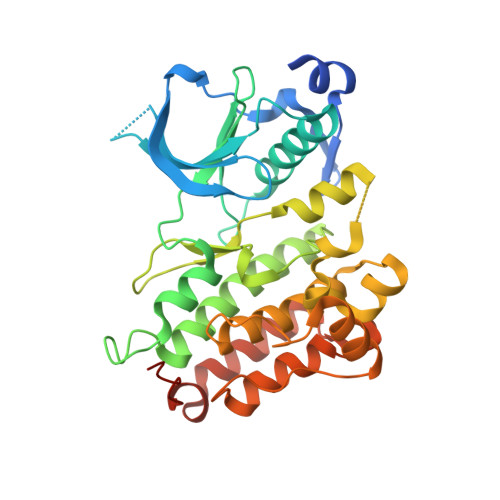NVL-655 Is a Selective and Brain-Penetrant Inhibitor of Diverse ALK-Mutant Oncoproteins, Including Lorlatinib-Resistant Compound Mutations.
Lin, J.J., Horan, J.C., Tangpeerachaikul, A., Swalduz, A., Valdivia, A., Johnson, M.L., Besse, B., Camidge, D.R., Fujino, T., Yoda, S., Nguyen-Phuong, L., Mizuta, H., Bigot, L., Nobre, C., Lee, J.B., Yu, M.R., Mente, S., Sun, Y., Kohl, N.E., Porter, J.R., Shair, M.D., Zhu, V.W., Felip, E., Cho, B.C., Friboulet, L., Hata, A.N., Pelish, H.E., Drilon, A.(2024) Cancer Discov 14: 2367-2386
- PubMed: 39269178
- DOI: https://doi.org/10.1158/2159-8290.CD-24-0231
- Primary Citation of Related Structures:
9GBE - PubMed Abstract:
Three generations of tyrosine kinase inhibitors (TKI) have been approved for anaplastic lymphoma kinase (ALK) fusion-positive non-small cell lung cancer. However, none address the combined need for broad resistance coverage, brain activity, and avoidance of clinically dose-limiting TRK inhibition. NVL-655 is a rationally designed TKI with >50-fold selectivity for ALK over 96% of the kinome tested. In vitro, NVL-655 inhibits diverse ALK fusions, activating alterations, and resistance mutations, showing ≥100-fold improved potency against ALKG1202R single and compound mutations over approved ALK TKIs. In vivo, it induces regression across 12 tumor models, including intracranial and patient-derived xenografts. NVL-655 inhibits ALK over TRK with 22-fold to >874-fold selectivity. These preclinical findings are supported by three case studies from an ongoing first-in-human phase I/II trial of NVL-655 which demonstrate preliminary proof-of-concept clinical activity in heavily pretreated patients with ALK fusion-positive non-small cell lung cancer, including in patients with brain metastases and single or compound ALK resistance mutations. Significance: By combining broad activity against single and compound ALK resistance mutations, brain penetrance, and selectivity, NVL-655 addresses key limitations of currently approved ALK inhibitors and has the potential to represent a distinct advancement as a fourth-generation inhibitor for patients with ALK-driven cancers.
- Massachusetts General Hospital Cancer Center, Boston, Massachusetts.
Organizational Affiliation:

















